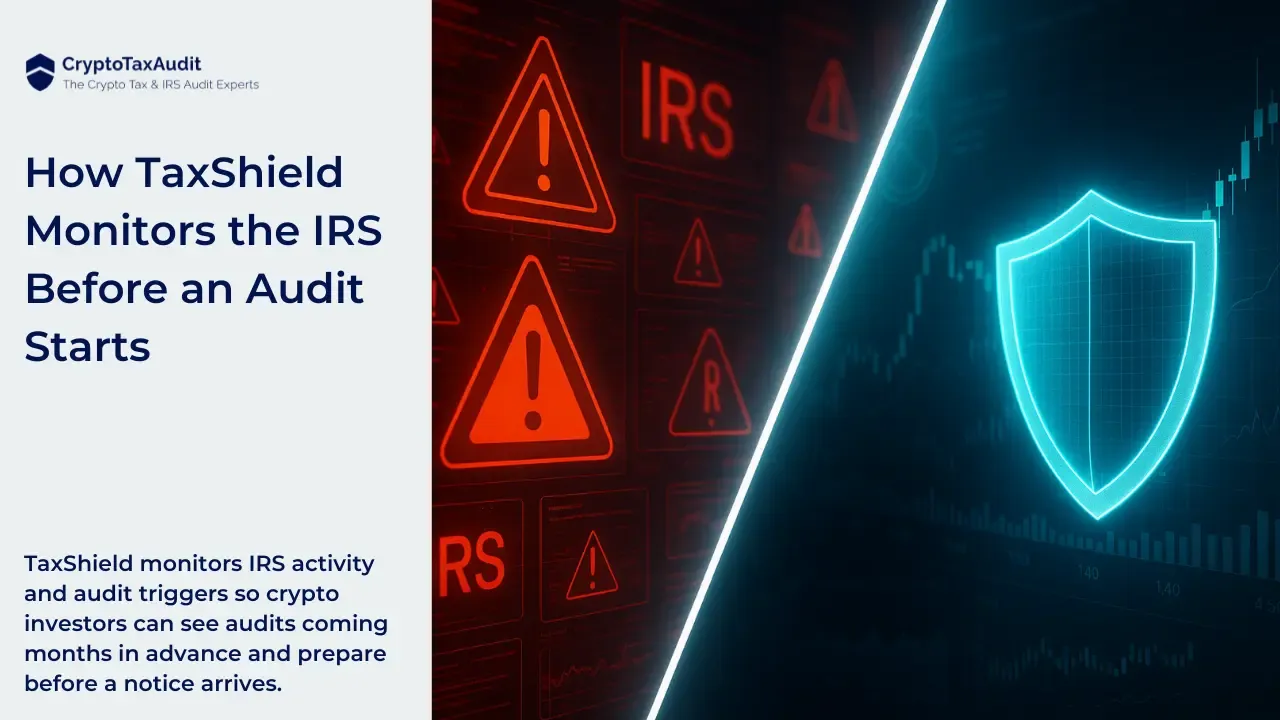
In spite of the 2023 lawsuit by the SEC, Coinbase, in 2024, remains the most popular crypto exchange in the US, with millions of American customers using the platform daily to trade crypto. However, the IRS has openly stated that as many as 75% of crypto holders are non-compliant, meaning they fail to report income and pay taxes on their digital asset transactions. The question for all those American Coinbase customers becomes, what does Coinbase report to the IRS? Regardless of whether Coinbase reports or does not, you should fully comply with IRS regulations and report crypto gains; it is important for taxpayers to be aware of the information shared by Coinbase with the service and of any potential discrepancies that could lead to trouble down the line.
Does Coinbase Report to the IRS?
Yes. Coinbase and every other major reputable crypto exchange will report US customers' data to the IRS. As of today, Coinbase will report to the IRS via:
Reporting Today
- 1099-MISC Reporting: If you earn $600 or more on Coinbase from any ‘miscellaneous’ income, such as Coinbase Earn or staking, you may receive a 1099-MISC. A copy of this form will also be sent to the IRS, so it is critical that you report properly.
- John Doe Summons: The IRS has been able to request data from exchanges by issuing a ‘John Doe’ Summons to obtain information on users who may have engaged in taxable cryptocurrency transactions.
- Other Methods: The IRS is actively looking for every way to obtain data on non-compliant crypto taxpayers. Any other ways in which the IRS could come across taxpayer data, such as information from other exchanges or criminal cases, will likely be used by the IRS.
Future Reporting
- 1099-DA reporting: Form 1099-DA, for digital assets, is the much anticipated new 1099 that will report crypto transactions for US taxpayers. This form will have to be issued by every broker for every US customer. At the moment, not much is known about the specifics of the form. This form is expected to be issued starting for tax year 2025. We should learn more about this form as the Treasury and IRS reveal more updates on the proposed crypto tax regulations.
Previously Used
- 1099-K reporting: The IRS has issued some forms 1099-K in previous years. While this form will not report taxable gains, it has given the IRS an indication of active traders by volume along with their personal identifiable information.
Centralized Exchange Reporting to the IRS
Is Coinbase the only crypto exchange to report to the IRS? No. Every reputable exchange operating within the United States and offering services to U.S. citizens is required to comply with IRS regulations. This compliance often includes reporting users' gains and transactions, particularly if the IRS, through due process, identifies a need to investigate potential non-compliance. Exchanges like Kraken, Gemini, Binance.US, Robinhood, and newer entrants like Fidelity fall under these compliant exchanges. Essentially, any centralized cryptocurrency exchange that conducts proper KYC procedures and allows U.S. citizens to access its services must report to the IRS as mandated by U.S. tax laws.
This becomes less clear when considering exchanges that have either ceased operations in the U.S. or never implemented KYC procedures. For instance, an exchange like Bittrex, which withdrew from the U.S. market, may still possess historical data on U.S. customers. These exchanges comply with IRS requests, subject to legal and regulatory frameworks, by providing necessary transaction data.
In contrast, exchanges such as KuCoin, known for not requiring KYC from U.S. customers, pose a significant challenge to the IRS. Without KYC, these platforms may lack comprehensive data linking cryptocurrency transactions to identifiable U.S. taxpayers. This makes it more complex for the IRS to track and enforce compliance, especially when these exchanges operate outside U.S. jurisdiction.
Regardless of these challenges, it's important for U.S. taxpayers to understand their legal obligation to report and pay taxes on all cryptocurrency transactions, irrespective of the exchange's KYC status or geographic location. The IRS increasingly scrutinizes cryptocurrency markets, and non-compliance carries significant risks even through foreign or non-KYC exchanges. Even without KYC at a foreign exchange, the IRS can always connect the dots to the data by linking to transactions from other exchanges or crypto wallets; remember, the Blockchain never lies, and powerful forensic tools can help the IRS find this data.
Tax Forms: 1099K, 1099-MISC, 1099-B, 1099-DA
Whether you are trading on Coinbase or any other KYC-compliant exchange allowing US customers, you will encounter the following tax forms:
1099-K: Payment Card and Third-Party Network Transactions
The 1099-K form, occasionally issued by cryptocurrency exchanges, reports transactions via payment cards and third-party networks rather than actual gains or losses from crypto trading. It's crucial for taxpayers to understand that this form reflects the total gross amount of these transactions, not the net gains or losses from trading activities. The 1099-K is sent to the taxpayer and the IRS, indicating transaction volumes without detailing taxable events.
An important change brought by the American Rescue Plan Act (ARPA) of 2021 is the lowered reporting threshold for third-party settlement organizations. This change significantly affects the reporting requirements for transactions processed through these networks. Despite this adjustment, the 1099-K does not contain the right information for tax reporting purposes. Taxpayers receiving this form from a crypto exchange should not rely on it, as it will not consider tax basis and will overstate your gains. However, receiving this form indicates that the IRS also has a copy of it, so they will expect you to report your transactions from such an exchange.
So if the Form 1099-K does not properly report gains and losses, why have some crypto exchanges opted to issue this form? This was mostly in prior years due to the industry's lack of clear regulatory guidance. This form ensures some level of reporting, so it was an easy first step for the exchanges and tax authorities. For tax year 2023, no exchanges are expected to issue 1099-Ks to report crypto transactions.
1099-MISC: Miscellaneous Income
The 1099-MISC form reports miscellaneous income in the cryptocurrency context, including mining, staking rewards, or airdrops. This income must be reported separately from trading gains or losses.
It is important to remember that all 1099-MISC forms you receive from a crypto exchange will be due to earning crypto, but not every time you earn crypto will you receive a tax form. Receiving airdrops, staking or earning any income in decentralized finance (DeFi) will not lead to you getting a 1099-MISC for such income. Keep in mind that not receiving a 1099-MISC does not mean that such income is not taxable. You should report and pay tax on any crypto income regardless of whether you receive a tax form.
When entering your 1099-MISC into your tax software, you will likely have to go to “miscellaneous” or “other” income. Remember that this type of income should not be subject tp self-employment taxes as it is not earned in a trade or business.
1099-B: Capital Gains and Losses
The Form 1099-B, commonly used for reporting capital gains and losses on securities transactions, is not widely utilized in cryptocurrency. Its application is limited to a few cryptocurrency exchanges that possess a broker license and choose to report using this form. For most cryptocurrency traders, receiving a 1099-B from a crypto exchange is not the norm. These forms, where issued, include information on the sale of assets, such as dates, sale prices, and cost basis. However, given the complexities and varying practices in the cryptocurrency industry, the information provided on a 1099-B by these exchanges might not always capture the complete picture of a taxpayer's crypto transactions.
It's crucial for taxpayers to understand that most crypto exchanges currently do not issue 1099-B forms. Instead, they often provide no specific tax documents, leaving the individual responsible for accurate reporting and record-keeping.
1099-DA: Future Crypto Reporting
Cryptocurrency tax reporting is poised for a significant change with the expected introduction of Form 1099-DA. Anticipated to be mandated from the tax year 2025 onwards, this form will be issued by platforms classified as brokers under new reporting rules. The 1099-DA is set to become the standard for reporting a wide range of cryptocurrency transactions, marking a shift from the current, less standardized reporting practices. Taxpayers involved in cryptocurrency should stay informed about this development to adapt to the new reporting requirements once they come into effect. This form is closely tied to developing the proposed crypto tax regulations.
Navigating Coinbase Crypto Tax Reporting
Since crypto exchanges are not yet required to issue tax forms to US customers, taxpayers are still on their own to gather the data and calculate their gains. Many Coinbase users use dedicated crypto tax tools to streamline the tax reporting process. These tools can analyze transaction history files and calculate capital gains and losses accurately. However, when using these tools, it's essential to ensure that all data, including the date, time, and nature of each transaction, is accurately represented. The slightest error in data input can lead to significant discrepancies in tax calculations.
Coinbase, like many other exchanges, provides several methods for users to manage their crypto tax reporting. Users can download their transaction history in CSV files or connect to your crypto tax tool via read-only API keys.
Downloading Transaction History:
Coinbase users can download their transaction history files directly from the platform. These files contain detailed records of all transactions, including buys, sells, transfers, and other activities. While downloading transaction history is straightforward, users should be aware of potential errors. One common issue is discrepancies in time stamps, which can occur due to time zone differences. Additionally, manually altering these files can lead to inaccuracies.
API Integration for Enhanced Accuracy:
An alternative to downloading transaction history is to connect Coinbase accounts directly to crypto tax tools via a read-only API key. This method allows for seamless and automatic transfer of transaction data, reducing the risk of manual errors. API integration ensures that all transaction data, including transfers to and from other exchanges, is captured accurately.
While both methods will yield the right outcome, connecting via API will lead to your tool automatically checking for new transactions and keeping your data updated; if you use CSV files, you must remember to download a new file whenever you have new transactions to add.
Costly Mistake to Avoid
Taxpayers with Coinbase accounts who have transferred crypto from or to Coinbase must be careful when downloading Coinbase tax reports. The Coinbase tax center will report an estimated gain; however, this amount will not be accurate for users who have transferred crypto in or out of Coinbase.
Do not report and pay taxes on the Coinbase estimated gain, as this amount will be overstated. Use the proper tools and connect your data properly to calculate your correct Coinbase gains. Coinbase does not report this estimated gain to the IRS but will cooperate with any requested data, including taxpayer transaction history; therefore, it is critical that you properly calculate your Coinbase gains and retain all records.
Coinbase Tax Accountant
Struggling with calculating your gains from Coinbase transactions? Unsure about how to report previously unreported gains on Coinbase for past tax years? Don't let the complexities of IRS compliance overwhelm you. At CryptoTaxAudit, we specialize in these very challenges. Our dedicated team, comprised of knowledgeable crypto accountants and certified CPAs, is fully equipped to guide you toward full compliance with the IRS. Take the first step in resolving your crypto tax concerns – schedule a free consultation with us today. Let us help you navigate the intricacies of crypto taxation with confidence.





